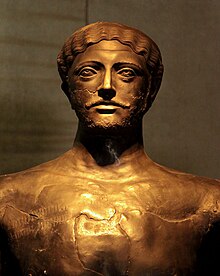Joktan
Joktan (also written as Yoktan; Hebrew: יָקְטָן, Modern: Yŏqṭan, Tiberian: Yāqṭān; Arabic: يقطان, romanized: Yaqṭān) was the second of the two sons of Eber (Book of Genesis 10:25; 1 Chronicles 1:19) mentioned in the Hebrew Bible.
Joktan's sons in the order provided in Genesis 10:26–29, were Almodad, Sheleph, Hazarmaveth, Jerah, Hadoram, Uzal, Diklah, Obal, Abimael, Sheba, Ophir, Havilah, and Jobab.
In his version, the three princes command all persons to bake bricks for the Tower of Babel; however, twelve, including several of Joktan's own sons, as well as Abraham and Lot, refuse the orders.
Ḥăṣarmāweṯ; Arabic: حضرموت) has been identified with the South Arabian region of Hadhramaut and according to various Bible dictionaries, the name "Hazarmaveth" means "court of death" which reflects a meaning similar to the Arabic folk etymologies of the region.
[8][9] One early proponent of this theory was the theologian Benito Arias Montano, who proposed a link between the names of Ophir, Joktan's son, and Peru.

